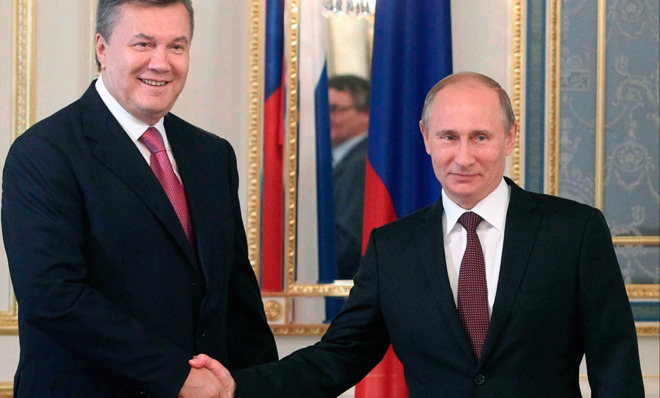The biggest story you're not paying attention to
The Cold War isn't over


A free daily email with the biggest news stories of the day – and the best features from TheWeek.com
You are now subscribed
Your newsletter sign-up was successful
Some events change the world overnight. Others take years to gestate, and even longer to show signs of influence. They often escape our notice entirely.
Something very important just happened in Eurasia, and the U.S.-Russian relationship will be forever changed because of it.
Since 1991, when the Soviet Union formally dissolved, Ukraine, the giant squirrel-shaped country to the east of Russia, has been flirting with a turn to the West. And for two decades, the European Union has been quite welcoming. Ukraine hasn't had it easy. The transition to a market economy was hard. Russia's unhappiness with the independence of its neighbor made itself known in the form of assassination attempts, poisonings, cyber warfare, and even, a few years ago, a shutting off of gas. What does Russia want? Very simple: They don't want Ukraine to join the West.
The Week
Escape your echo chamber. Get the facts behind the news, plus analysis from multiple perspectives.

Sign up for The Week's Free Newsletters
From our morning news briefing to a weekly Good News Newsletter, get the best of The Week delivered directly to your inbox.
From our morning news briefing to a weekly Good News Newsletter, get the best of The Week delivered directly to your inbox.
They don't want the Ukraine to westernize their economy and political system. They don't want their breadbasket to wind up with the Main Enemy's friends in Europe. This is indeed the silent Cold War after the Cold War.
John Schindler, a military historian, put it succinctly on Twitter: "Since 1991, Ukraine's ultimate political destination — East or West — has been contested and up for grabs. It's over. Now we know."
And Ukraine was THIS CLOSE. The parliament was on the verge of agreeing to the reforms insisted on by the EU. A signing ceremony was scheduled for Vilnius next week. President Victor Yanukovich had decreed that the turn west was the logical course for the country to take. And then he changed his mind. Trade deal with Europe was kiboshed.
And he ordered his advisers to re-open talks with Moscow. His public explanation for the volte-face is probably an iceberg tip: He worries about losing Russia as a trading partner. More likely, he worries about turning Russia into an enemy, awakening the sleeping bear. Russia's first retaliatory step would have been to cut off energy supplies once again, which, in the short term, would wreak havoc on Ukraine's already fragile economy. (EU promises to make up for whatever Russia cut off fell on deaf appears, apparently).
A free daily email with the biggest news stories of the day – and the best features from TheWeek.com
What happens now?
Nothing. Russia browbeats the Ukraine into submission. The Eastern Partnership, the EU's name for its outreach to former Soviet states, is effectively dissolved. Ukraine's decision to remain in Russia's orbit will change the center of gravity when the geopolitical and resource wars of the 21st century heat up, as they are certain to do.
Marc Ambinder is TheWeek.com's editor-at-large. He is the author, with D.B. Grady, of The Command and Deep State: Inside the Government Secrecy Industry. Marc is also a contributing editor for The Atlantic and GQ. Formerly, he served as White House correspondent for National Journal, chief political consultant for CBS News, and politics editor at The Atlantic. Marc is a 2001 graduate of Harvard. He is married to Michael Park, a corporate strategy consultant, and lives in Los Angeles.
-
 The Olympic timekeepers keeping the Games on track
The Olympic timekeepers keeping the Games on trackUnder the Radar Swiss watchmaking giant Omega has been at the finish line of every Olympic Games for nearly 100 years
-
 Will increasing tensions with Iran boil over into war?
Will increasing tensions with Iran boil over into war?Today’s Big Question President Donald Trump has recently been threatening the country
-
 Corruption: The spy sheikh and the president
Corruption: The spy sheikh and the presidentFeature Trump is at the center of another scandal
-
 Why Puerto Rico is starving
Why Puerto Rico is starvingThe Explainer Thanks to poor policy design, congressional dithering, and a hostile White House, hundreds of thousands of the most vulnerable Puerto Ricans are about to go hungry
-
 Why on Earth does the Olympics still refer to hundreds of athletes as 'ladies'?
Why on Earth does the Olympics still refer to hundreds of athletes as 'ladies'?The Explainer Stop it. Just stop.
-
 How to ride out the apocalypse in a big city
How to ride out the apocalypse in a big cityThe Explainer So you live in a city and don't want to die a fiery death ...
-
 Puerto Rico, lost in limbo
Puerto Rico, lost in limboThe Explainer Puerto Ricans are Americans, but have a vague legal status that will impair the island's recovery
-
 American barbarism
American barbarismThe Explainer What the Las Vegas massacre reveals about the veneer of our civilization
-
 Welfare's customer service problem
Welfare's customer service problemThe Explainer Its intentionally mean bureaucracy is crushing poor Americans
-
 Nothing about 'blood and soil' is American
Nothing about 'blood and soil' is AmericanThe Explainer Here's what the vile neo-Nazi slogan really means
-
 Don't let cell phones ruin America's national parks
Don't let cell phones ruin America's national parksThe Explainer As John Muir wrote, "Only by going alone in silence ... can one truly get into the heart of the wilderness"
